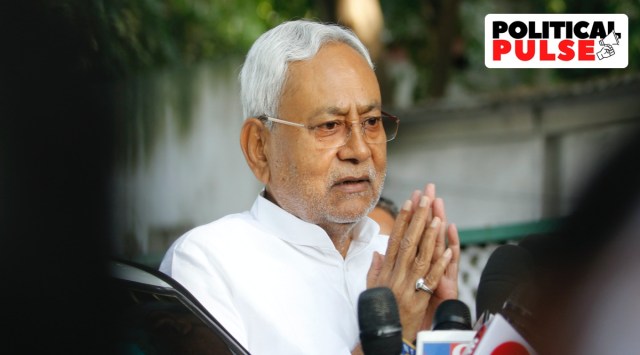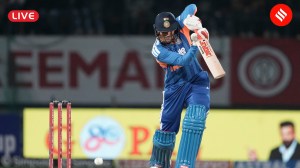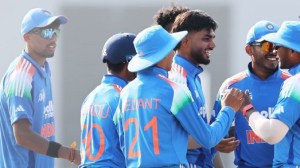It is a tale of a chief minister’s two different takes on a liquor policy. A chief minister who liberalised his state’s liquor policy during his first term but changed course and made a U-turn during his third term with broader political objectives in mind. It is the story of Bihar CM Nitish Kumar whose take on liquor changed in eight years.
During his first term (2005-’10), Nitish liberalised Bihar’s liquor policy by 2008 and increased the excise revenue from Rs 500 crore in 2006 to Rs 6,000 crore in 2015. In April 2016, Nitish imposed a total liquor ban by invoking Mahatma Gandhi and the Directive Principles of State Policies. But after it did not work out as a political move, the implementation of the law faltered. Since it came into force, the state government has thrice amended the law.

Now, he cannot scrap prohibition without losing face and is also unable to fully enforce it. As a result, the Bihar CM has been losing his cool over spirits when confronted by a spirited Opposition.
The Janata Dal (United) leader is under fire from the Opposition over 40 suspected hooch deaths in Saran since Tuesday. The CM has been abrasive while answering questions on liquor policy in recent days and has said, “Piyoge to maroge (you will die if you drink).” He has also said that he will not consider well-read people “well-read if they drink”. Losing his cool, the CM told Leader of Opposition Vijay Kumar Sinha on Wednesday, “Chup raho (shut up)” when the BJP leader raised the Saran hooch death case in the Assembly. On Friday, dismissing demands for compensation for the kin of those killed in Saran, Nitish said, “Sharab pee kar mara hai to compensation kaisa (where is the question of compensation when they died after drinking liquor?”
National plank
In the first week of April 2016, Nitish Kumar held an informal discussion with journalists in his chamber in the Assembly after his government announced a partial prohibition by banning country liquor. The CM was enthused by women from multiple self-help groups protesting across the state in front of Indian-made Foreign Liquor (IMFL) shops. “Just wait for some surprises,” Nitish told the reporters in his chamber. A few days later, he announced a total liquor ban in the state.
With this, he tried to achieve two things — further broadening his “caste-neutral” constituency of women that he had already cultivated with several welfare schemes, including the popular initiative of giving free bicycles to girls studying in Class nine. The JD(U) leader believed that a liquor ban would curtail incidents of domestic violence and other crimes.
Story continues below this ad
But his bigger objective was to showcase prohibition as his national political plank.
At the time, Nitish was in alliance with the Rashtriya Janata Dal (RJD), and the Congress. The Mahagathbandan had won 178 of Bihar’s 243 seats in the Assembly elections the year before. After parting ways with the BJP in June 2013, Nitish had contested the 2014 Lok Sabha polls alone and his party’s seat count in the parliamentary polls came down from 20 seats to two.
In months after imposing prohibition, the CM travelled to Uttar Pradesh, Jharkhand, and Maharashtra and was praised for his bold decision, including by some Gandhian groups that sought to meet and thank him in person.
But his strategy did not work as there was hardly any taker for the liquor ban in the Congress-led United Progressive Alliance (UPA). The Congress did not warm up to Nitish and, eventually, the JD(U) leader nursing national ambitions was back to saying that his mandate was to serve Bihar. In July 2017, he was back in the BJP-led National Democratic Alliance (NDA).
Politically, prohibition was placed on the back burner. It was poorly enforced by the state administration and frequent incidents of hooch deaths were reported from across the state. Most people arrested under the prohibition law were from Other Backward Classes (OBCs), Extremely Backward Classes (EBCs), and Scheduled Castes (SCs). These three communities are a prime constituency of Nitish.
Story continues below this ad
The CM revisited the law and amended it thrice to dilute its stringent provisions such as the imposition of a community fine, and the arrest of all in a family if any member is found storing and consuming alcohol. A person caught the first time for drinking alcohol can now get away by paying a fine between Rs 2,000 and Rs 4,000.
Revenue source
When Nitish took over as Bihar CM in November 2005, his thinking on liquor policy was completely different. At the time, he realised that the state budget was just around Rs 27,000 crore, with little source of revenue generation. To increase revenue, he narrowed it down to two ways — boosting land and flats’ registration and liberalising the liquor policy. Alcohol shops were allowed to open in panchayats. As a result, the state excise revenue kept rising. Though there was widespread criticism of the move, the government stayed the course.
But the idea of imposing prohibition came to the CM when women started attending his public meetings in big numbers. Several of them complained that their husbands beat them in an inebriated condition. The CM listened to these pleas but did not ban alcohol till he switched sides and found a strong political incentive.

































